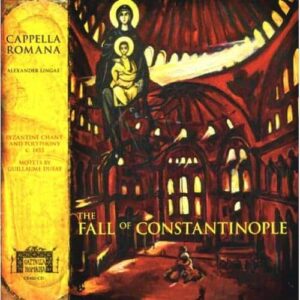 Before this weekend’s presentations of The Fall of Constantinople, here’s a look back at Gramophone Magazine’s review of our recording of this repertoire:
Before this weekend’s presentations of The Fall of Constantinople, here’s a look back at Gramophone Magazine’s review of our recording of this repertoire:
“English-speaking audiences commonly associate Greek Orthodox plainchant with the music of John Tavener, whose work draws substantially from its ethos. This recording confronts plainchant with the compositions of another Western composer, albeit one from the 15th century, when the two Christian churches were nearly reunited after a thousand-year split. It’s even likely that Dufay’s singers and their Eastern counterparts had a chance to hear each other in Florence. But these attempts at reconciliation came to nothing, and in 1453 came the event after which this disc is named, and to which Dufay devoted a commemorative lament, which concludes this recital very movingly.
The performance of Wester polyphony with voices trained in, or inflected by, Eastern chant is not unfamiliar — Ensemble Organum have been doing it for years. To do so, it’s not necessary to invoke a context within which the two might have commingled; as Alexander Lingas observes in his informative note, it’s likely that the Greeks found Dufay’s polyphony “incomprehensible”. But it must have been a fascinating confrontation, and it’s that sense of occasion that’s conveyed here. The range of performance options for the plainchant itself is surprisingly diverse, and an intriguing new light is shed on Dufay’s motets: the five-voice Apostolo gorioso is particularly striking, although Ecclesiae militantis is a touch less sure. The singers are miked more distantly than is usual nowadays for polyphony, but this only adds to the sense of pleasurable unfamiliarity.” —Fabrice Fitch, Gramophone Magazine

You must be logged in to post a comment.